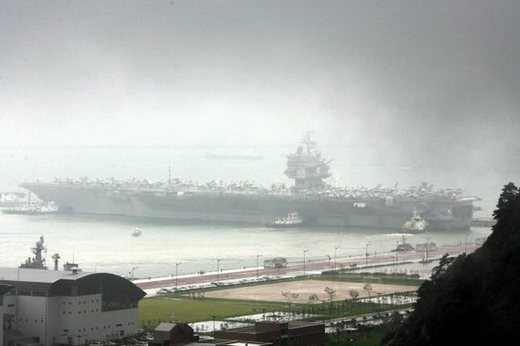 |
|
A U.S. Navy carrier, Enterprise, makes a call at Busan port on July 18.
|
Former defense ministers say it is too early to hand over control
The controversy surrounding wartime military command in South Korea continues to gain momentum. When some in Washington unofficially expressed their dissatisfaction over progress on the issue, conservative media and opposition parties in Seoul criticized the current administration, calling the situation a security crisis and a damage to the U.S.-South Korea alliance. The conservative outcry coincided with a similar reaction from former defense ministers, a pattern repeated several times over the past few years. Also, as a high-ranking U.S. official said that Washington expects to return the wartime military control to South Korea in 2009, three years ahead of Seoul’s expected timeframe, concerns were raised about a significant rift in the security alliance between the two nations. Divergent explanations were offered by South Korean government officials about Washington’s stance on the issue. One government official said, "In the case of the South Korean-U.S. combined forces, a dismantling period beginning in 2006 may already be an open fact." The official said the U.S. defense department’s thinking is that "a three-year transfer period is sufficient, and it would not be appropriate to allow a six-year transfer period, ending in 2012," which Seoul has asked for.But the official said that if some say this disagreement reflects a weakening alliance between South Korea and the U.S., they are seeing today’s reality through the false lens of the past. An often-cited argument by those opposed to South Korea’s taking back of wartime military command is that it is too early to regain control. These opponents do not directly say the U.S. should continue to exercise wartime command of South Korean troops indefinitely, but argue that if South Korea shortens the timeframe by three years, a security vacuum will occur. South Korea needs to do more to prolong the handover, they say. Former defense minister Lee Sang-hoon said, “If the South Korean-U.S. combined forces are dismantled, it will eventually lead to a withdrawal of U.S. troops from here,” seeing that as a security issue with potential negative impact on the peninsula. Those arguments were different from official explanations from the U.S. side and prior agreements between the two nations. But on Aug. 7 a high-ranking U.S. official hinted at the possibility of further cutting the number of U.S. troops stationed here, seeming to substantiate the argument of former defense minister Lee and others. There are some who say South Korea should delay taking back wartime military control until after reunification. Kim Hee-sang, who was a defense advisor under the Roh Tae-woo government, said in a media interview that "it may not be too late a time [for South Korea to regain wartime military control] after Northeast Asia is stabilized with the reunification of the Korean peninsula and the democratization of China.” Overall, according to a top-ranking government official, Seoul was caught off guard when the timing issue for taking back wartime military command was abruptly raised again. According to the official, the issue traces back to the late 1980s, when the U.S. proposed an East Asia Security Initiative which included the return of peacetime and wartime military command to South Korea and dismantling the combined forces by 1990. The official pointed out that two former presidents, Roh Tae-woo and Kim Young-sam, were the most vocal about taking back wartime military command and dismantling South Korean-U.S. combined forces. The Roh Tae-woo administration had planned to regain control by 1995 and the Kim Young-sam administration had planned to do so by 2000. Under the Roh Tae-woo administration, Lee Sang-hoon was a defense minister and Kim Hee-sang a defense advisor. Their recent comments opposing the handover of wartime command stand in stark contrast to the position of the administration on which they served.






